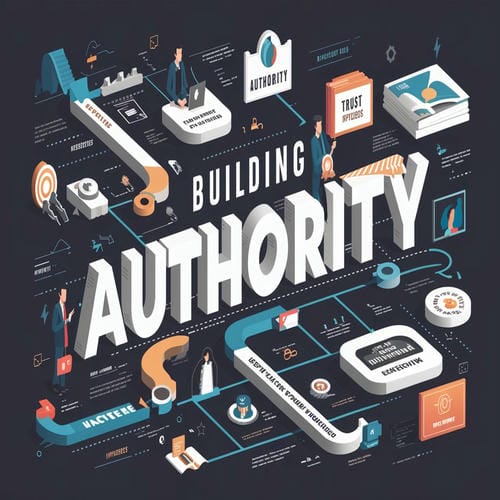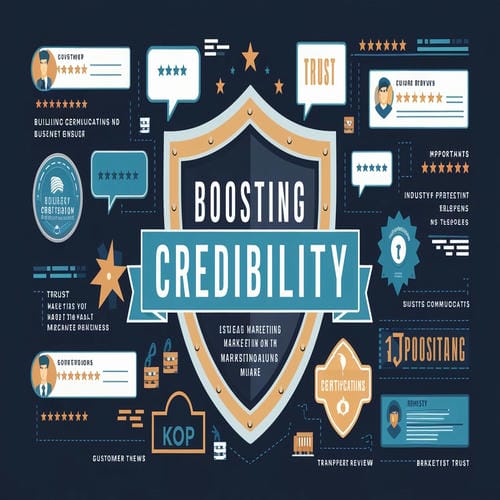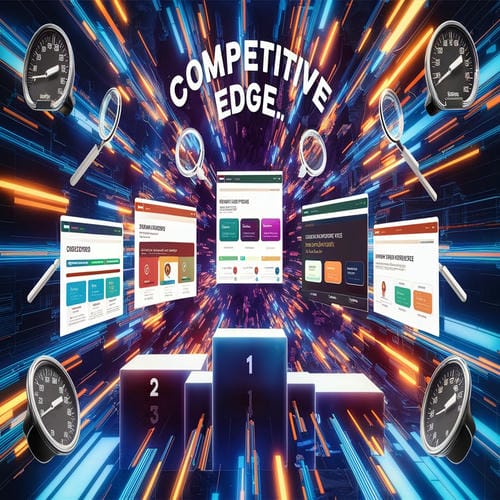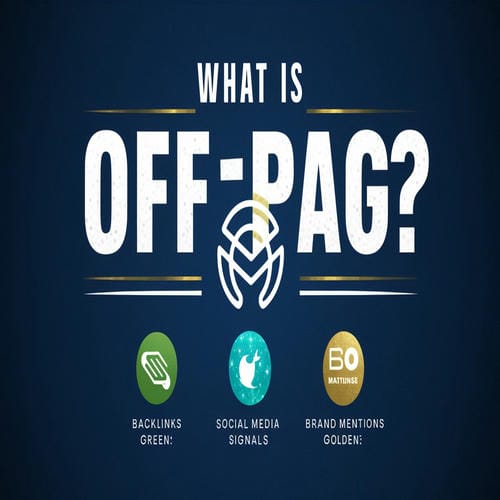Off-Page SEO Tips 2024 by Devtrain
Why do some websites consistently appear at the top of search engine results, while others struggle to gain visibility?
The answer often lies in mastering a fundamental yet frequently underestimated tactic—off-page SEO. Unlike on-page SEO, which focuses on optimizing elements on your website, off-page SEO involves activities outside your site that can significantly impact your search engine rankings.
It’s all about building your website’s reputation and authority through external means like backlinks, social media signals, and brand mentions. Why is off-page SEO so crucial? Because it helps search engines understand how others perceive your site. If you have high-quality backlinks and positive engagement on social media, search engines are more likely to rank your site higher.
Ready to dive deeper and learn how off-page SEO can boost your website’s visibility and credibility? Let’s explore the key elements, techniques, and benefits of mastering off-page SEO.
What is Off-Page SEO?
Off-page SEO can be defined as the processes that are conducted outside your website to influence your place in SERP. These actions assist search rankings and enable other sources to convey how authoritative and relevant your site is.
1. Off-page SEO and on-page SEO
While on-page SEO concentrates on changes carried out on individual pages of the website, off-page is all about external changes/activities. These include the backlinks, the social signal, and the brand mentions. All of these are crucial to an efficient SEO campaign.
2. Importance of Off-Page SEO
Off-page SEO is important since it assists in the promotion of the site so that it can be recognized as genuine and as having reputable content. External signals which are also called off-page SEO are the factor that defines the credibility and usability of your site to the search engines. Sometimes, it is possible to work very hard on the on-page factors and still not get the expected results, if the off-page factors are not well initiated.
Must Read:
- What is White Hat SEO (Search Engine Optimization)?
- What is SEO in Digital Marketing?
- What is SEO Writing?
- What is Local Search Engine Optimization?
Why Is Off-Page SEO Important?
1. Building Authority
Off-page SEO therefore assists in establishing the authority of the website. You will be ranked much higher if other relevant and well-renowned sites direct visitors to your site. This authority also increases your ranking capability.

2. Increasing Visibility
Qualified off-page SEO enhances the exposure of your website. High-quality backlinks and their availability on social networks make your site more popular in safety, which attracts more free visitors.

3. Boosting Credibility
Off-page SEO helps in improving the reputation that is associated with your site. Anything positive –likes, mentions, and links from trusted sources support your content, letting search engines know that it is valuable.

4. Competitive Edge
Off-page SEO investment is beneficial to any business because it puts the business ahead of other similar businesses. The off-page SEO techniques reveal the fact that those websites are usually more effective than all those that may only have the on-page optimization.

Must Read:
- How We Can Learn Search Engine Optimization?
- How to Optimize Website for Google Search Engine?
- Is Search Engine Optimization Worth it?
- How to Learn Search Engine Optimization?
On-Page SEO vs. Off-Page SEO
1. Definition and Techniques
On-page SEO is the practice that modifies aspects of your website. These are keyword optimization, meta tags, quality of the content, and internal linking. This makes your website friendly to the search engine as well as pleasant to the users.
Off-Page SEO does not involve managing your website but relates to other sites on the internet. Some key techniques could be link building, especially quality backlinks, social media, and brand promotion. These are the external factors that help your site to gain popularity and become an authoritative resource.
2. Key Differences
On-page SEO refers to factors within your website that you can influence and that includes; content & HTML source code. On the other hand, page optimization is focused on improving the reputation and credibility of the website from outside the website.
3. How They Work Together
One can conclude that both on-page and off-page SEO are essential to the overall success of an SEO campaign. Onsite optimization makes your site conform to search engine guidelines and is easy to navigate while offsite makes your site popular and trustworthy. Combined, they enhance the ranking and visibility of your site in the search engines a factor that helps in ranking your site.
Related Articles:
- How to Earn Money by Search Engine Optimization?
- How to Become a Search Engine Optimization Specialist?
- How Does Search Engine Optimization Work?
- How to use Search Engine Optimization?
Key Elements of Off-Page SEO
1. Backlinks
Off-page SEO factors and more particularly backlinks are very important elements in SEO. It is generally the pointers to your site from other sites. Unlike low-quality links, which probably come from doubtful sources, good-quality backlinks make search engines trust your website as authoritative.
To get these, there is no better way than to offer others quality content that they can as well link to. Also, do not overlook guest blogging and the practice of niche site outreach.
2. Social Signals
Social signals can be defined as activities done on social media platforms related to your website. Despite controversies concerning their relation to the rankings of search results, social signals are undoubtedly valuable and demanding.
Having a good social media stream can help generate traffic and awareness about the brand and possibly more backlinks. To help increase the social signals you expose your content to different platforms and participate in the community.
3. Brand Mentions
Anytime your brand is mentioned on other websites regardless of the link with your site then it is referred to as a brand mention. These mentions can even assist in brand building and help to increase the general awareness of a brand.
To achieve higher brand mentions, concentrate on PR initiatives, cooperate with key opinion leaders, and engage in such topics. Social media brings in new means by which the mentioned keywords can be utilized and such monitoring tools can assist in tracking all of them.
4. Guest Posting
Guest blogging is a process where you write articles for other websites that are in your field. This strategy also assists in earning backlinks and often introduces your content to more people. When writing articles for other blogs/websites, it is recommended that the articles created are of great quality and should align with the audience of that website. This helps in establishing one’s reputation when it comes to the industry best and it also assists in developing networks with other people in the same industry.
5. Influencer Outreach
Thus, influencer outreach’s meaning lies in establishing a connection with individuals of high influence in your sphere. These influencers can assist in the dissemination of your content as well as improve the inevitability of your brand.
Find out who your competitors in terms of positioning are and whose content you can share can mutually beneficial cooperation benefit. Endorsements from influential personalities are very effective in the development of your off-page SEO strategies.
6. Content Marketing
Off-page SEO aims at promoting the website across different platforms and among various communities and content marketing is a critical part of it. Providing and sharing high-quality and timely content that is relevant to a specific demographic can build traffic. Original and good content can attract link-back references and social sharing. Apply different types of content like blog posts, infographics, videos, and whitepapers, and by doing so, you influence people.
Trending Articles:
- How to Optimize a WordPress site for Search Engines?
- How to Optimize Blog for Search Engines?
- How to Improve Search Engine Optimization?
How Does Off-Page SEO Work?
1. Search Engine Perspective
Search engines also used off-page elements in order to determine the credibility and the relevance of your site. That reflects the relevance of parameters, which are supposed to be taken into account when analyzing backlinks, activity in social networks and mentions of the brand. These signals assist the search engines in evaluating how other are viewing or interpreting your site, all of which has an effect on your ranking.
2. Link Building Mechanics
Off-page SEO is a broader concept among the SEO techniques, and link building is one of the significant parts of it. This is why when other reputed sites link their clients or users to your site and content, search engines view your site as a credible and authoritative site. This research also takes into consideration the quality of these backlinks as opposed to the quantity. Concentrate on putting links from such destinations that are relevant to a given niche.
3. Social Media Impact
Off page SEO is optimized by activity on social media as visibility is enhanced and the target site receives more traffic. Interesting, growing and getting discussed content is likely to stimulate greater number of back links and consequent brand mentions. Regular presence on the social network site is also beneficial in boosting the rating of the site hence improving on the companies SEO.
4. Brand Mentions and Credibility
The types of off-page SEO are brand mentions linked and unlinked brand mentions. This informs the different search engines that your brand is popular and talked about within the different industries. This is because it will help in not only frequently checking on those mentions but also benefiting from it by expanding the authority and credibility of the site.
Techniques to Improve Off-Page SEO
1. Link Building Strategies
Link building still forms part of the essentials in off-page SEO despite the changes that have occurred in the past years. In link building it is advised that one should aim at getting links from sites that are authoritative and relevant to the site in question. They include writing articles for other blogs, contacting influential bloggers for backlinks, and commenting on forums that target clients frequently. Do not buy links, and do not use link schemes, as it is forbidden by Google and can result in the deterioration of your site’s rank.
2. Social Media Engagement
Off-page SEO revolves around increasing the engagement of the results that already exist through social media. Update and have present accounts in various social networks that are related to your content and post frequently. It is recommended to promote posts within your audience to share them with others to widen the post’s reach and attract possible backlinks. Interact with your followers and make comments to increase the overall trust that you have established with your followers.
3. Influencer Collaboration
Working with other content creators can help to increase the reach and reliability of the content. Make a list of other forms industry leaders post on and interact with their posts. Ideas for cooperation could be guest articles, webinars, and product reviews. Through influencers, your brand is marketed to their followers making your business popular and thus more traffic and backlinks.
4. Content Promotion
Off-page optimization requires the use of appealing and relevant content if the intended results are to be achieved. Considering the target audience, make use of mail newsletters, banner advertisements on social networks, and websites cooperation. Use your contacts and connections to expand your audience and, thus, ensure that more people will most likely share the content you provide.
5. Online Communities and Forums
It is beneficial to participate in the communities and forums related to your business as it establishes credibility and fosters professional connections. Do not advertise your business directly but post useful information so that there is an opportunity to introduce your business during the conversation. It can help you draw attention, get backlinks, and also can help you to gain your position in the given community.
Using these techniques methodically will help in the off-page SEO and consequently help in better search engine rankings.
Generate Brand Signals
1. Importance of Brand Signals
Brand signals are hints to search engines concerning the reputation and the authority of your brand. They range from simple indicators such as brand name searches, the presence in social networks, and general Web activity. Effective brand signals are found to raise a website’s rank on search engines and to enhance credibility to users.
2. Techniques to Strengthen Branding Information
- Consistent Brand Messaging: This means that your branding message and voice should be consistent regardless of the channel in which it is delivered.
- Public Relations (PR): Devote time to PR activities that aim to get more coverage and mentions of the brand in the media.
- Social Media Strategy: Establish cultural and official accounts on popular and pertinent social media sites. From this perspective, it is best to continuously post relevant information and respond to the posts of your audience to establish a community with a strong brand association.
- Influencer Partnerships: Partner with influential people who support your business and its target market. They can indeed bring an advantage in generating brand awareness and brand authority.
- Online Reputation Management: Ensure you frequently check the internet for any post that has something to do with your brand and reply to every comment in as much as it will be useful to reply to only the complaints. Dealing with issues openly makes your brand better and gives it a positive image.
3. Monitoring and Optimization
Ensure that you use equipment and statistic controls in tracking your brand signals correctly. Monitor references made to individual tracks and social networking sites and the general attitude towards the brand. Conduct periodic analysis and benchmarking on these experiences to enhance your brand signals and off-page SEO effectiveness.
Improve E-A-T (Expertise, Authoritativeness, Trustworthiness)
1. Definition of E-A-T
E-A-T are Abbreviation of three concepts; Expertise, Authoritativeness, and Trustworthiness. This is a concept that Google particularly focuses on in its search quality guidelines to rate the quality of web content as well as the reliability of the websites that create it.
2. Strategies to Enhance E-A-T
- Create High-Quality Content: Pray to deliver quality content that is relevant, factual, and exhaustive in its coverage with content being a reflection of your mastery of a particular discipline. Ensure that you use proper references and also make sure that they are credible ones.
- Showcase Author Credentials: Introduce the expertise of authors and the credentials they hold in case you are using their works in your content. Information that could be included may comprise of author’s bio, qualifications, and experience.
- Build Authoritative Backlinks: Never link back your site with sites that are not well established and those that are not within your niche. Such approvals assure the search engine that the material you are sending out is credible.
- Maintain Website Security and Transparency: Make your website secure (SSL/HTTPS) while being open: provide your company details, privacy policy, and terms and conditions of using your website.
- Positive User Experience: Ensure that the user is given a good experience by making the site easy to navigate, load fast, and is optimized for mobile devices. The findings indicated that the different aspects of the user experience lead to trustworthiness.
3. The Relevance of E-A-T in Off-Page SEO
Thus, increasing E-A-T remains highly relevant for off-page SEO because it determines how others regard your site’s reliability and specialization. That is why those web resources with high E-A-T have more chances to obtain high-quality backlinks, positive mentions, and social approval, which are crucial during off-page optimization.
If you learn and apply ways how to increase E-A-T, let alone the off-page SEO effect, you will also be able to transform your website into one that is considered authoritative in your business niche.
Measuring Off-Page SEO Success
1. Key Metrics to Track
- Domain Authority: Domain Authority (DA) is a metric developed by Moz that predicts how well a website will rank on search engine results pages (SERPs). It is influenced by factors such as the quality and quantity of backlinks, as well as overall site authority.
- Backlink Profile: Analyze your backlink profile to assess the quality and diversity of backlinks pointing to your site. Focus on acquiring high-quality backlinks from authoritative sources relevant to your industry.
- Social Media Engagement: Track metrics such as likes, shares, comments, and followers across your social media platforms. Engaging content that generates high levels of social engagement can contribute to increased visibility and traffic.
2. Tools for Monitoring Off-Page SEO
- Google Search Console: Monitor your site’s performance in Google’s search results. Use the Links report to analyze your site’s backlink profile and identify opportunities for improvement.
- Moz Link Explorer: Use this tool to analyze backlinks, identify linking domains, and track changes in Domain Authority over time.
- Social Media Analytics Tools: Platforms like Facebook Insights, Twitter Analytics, and LinkedIn Analytics provide valuable insights into social media engagement metrics.
3. Optimizing Off-Page SEO Strategies
Regularly review and analyze these metrics to gauge the effectiveness of your off-page SEO efforts. Identify areas for improvement and refine your strategies accordingly. For example, if you notice a decline in backlinks or social media engagement, adjust your outreach and content promotion tactics.
Common Off-Page SEO Mistakes to Avoid
1. Low-Quality Backlinks
Low-quality backlinks can harm your site’s reputation and SEO efforts. Avoid acquiring links from spammy or irrelevant sites, as these can lead to penalties from search engines. Focus on quality over quantity when building backlinks.
2. Ignoring Social Media Signals
Neglecting social media can hinder your off-page SEO strategy. Active engagement and sharing of content on social platforms can contribute to increased visibility, brand awareness, and traffic to your site. Maintain consistent and meaningful interactions with your audience.
3. Overlooking Brand Mentions
Brand mentions, whether linked or unlinked, play a role in off-page SEO. Monitor mentions of your brand online and capitalize on opportunities to build credibility and authority. Encourage positive reviews and mentions from reputable sources.
4. Engaging in Black-Hat SEO Practices
Black-hat SEO tactics such as buying links, keyword stuffing, and cloaking can result in severe penalties from search engines. These practices undermine the integrity of your site and should be avoided at all costs.
5. Lack of Diversified Link Building
Diversify your link building efforts to include a variety of sources such as guest blogging, influencer partnerships, and industry directories. This approach ensures a natural and sustainable growth of your backlink profile.
6. Focusing Solely on Quantity
While acquiring backlinks is important, quality matters more than quantity. A few high-quality, relevant backlinks from authoritative sites can have a more significant impact on your SEO than numerous low-quality links.
Avoiding these common off-page SEO mistakes is essential for maintaining a strong online presence and maximizing your site’s potential in search engine rankings. By implementing ethical and effective off-page SEO strategies, you can enhance your site’s authority, credibility, and visibility over time.
Conclusion
Mastering off-page SEO is crucial for enhancing your website’s authority and visibility in search engine results. By focusing on strategies like building high-quality backlinks, engaging on social media, and optimizing brand signals, you can significantly improve your site’s rankings.
Consistently monitoring metrics such as domain authority and backlink profile ensures your efforts remain effective over time. Ready to elevate your SEO game?
Visit Devtrain.co to explore comprehensive SEO training and strategies that empower your online presence.


